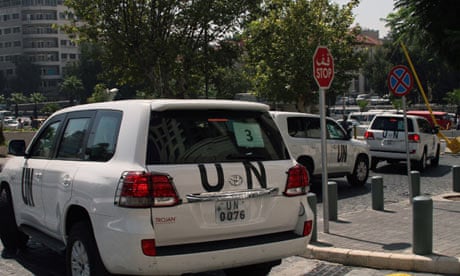If the US, Britain and their allies carry out punitive air strikes against the Syrian regime because of the use of chemical weapons they will most probably have to do it without a United Nations mandate, raising questions over how such an intervention could be justified by law.
The UN inspection team currently in Damascus is likely to take a considerable time coming to a conclusion as it must follow rigorous protocols. The five days that have elapsed since the apparent gas attack in Ghouta, eastern Damascus, mean that decisive forensic evidence could have dissipated. In any case, the UN mandate, written by the security council, is to determine if chemical agents were used, not who used them.
In the absence of a formal "smoking gun" provided by the UN inspection, the security council is unlikely to back military action. Russian has been steadfast in its defence of the Assad regime so far, and China has followed suit. Moscow says it will declare any military intervention illegal.
Going to war without a UN mandate is legally complicated, and Barack Obama, a former law professor, has shown he is well aware of the issues that are in place.
The president told CNN on Friday: "If the US goes in and attacks another country without a UN mandate and without clear evidence that can be presented, then there are questions in terms of whether international law supports it, do we have the coalition to make it work?"
The New York Times has reported that Obama's team is looking at the 1999 Kosovo conflict for precedents, as that involved air strikes without a UN mandate against Russian ally Serbia, which was committing atrocities.
In Kosovo, Bill Clinton used Nato backing and the requirement to protect large numbers of endangered civilians as justification. Since then the United Nations has formally adopted the "responsibility to protect" (R2P) as an international norm which could justify outside intervention in a country's internal affairs, if that state had failed to protect its population from atrocities. R2P, established in 2005, could be advanced as a legal justification in Syria, but its validity in the absence of a security council mandate is in dispute.
The specific criterion in the Syria case is the apparent use of chemical weapons. That is banned by the 1993 Chemical Weapons Convention (CWC), but Syria is not a signatory to the treaty. Mark Reiff, senior lecturer in law at the University of Manchester, and an expert on the ethics of armed conflict, says that does not matter.
"When a principle is generally accepted by the members of the international community, it becomes part of what is called international customary law – a kind of international common law – which is just as binding on states as a treaty," Reiff argues.
Dan Joyner, a law professor at the University of Alabama and the author of International Law and the Proliferation of Weapons of Mass Destruction, also points out that Syria is a signatory to an earlier international agreement, the 1925 Geneva Gas Protocol, and is bound by it.
"These conventions and the parallel customary international law attached to them very clearly prohibit the use of chemical weapons during armed conflict," Joyner wrote on the Arms Control Law blog. "So I think there is no doubt that, if indeed chemical weapons have been utilised by Syrian government forces, Syria has violated the law of armed conflict."
David Bosco, assistant professor of international politics at American University in Washington, does not believe the sort of legal principles that have underpinned humanitarian intervention in recent years do not fit the Syrian situation, as it would presumably involve a punitive strike rather than a longer-term campaign to oust the Assad regime and replace it with something better.
"There's another concept with deep roots in international law that might offer a more viable pathway for action: reprisal. In essence, the doctrine allows one party to respond to another's clear violations of international law by engaging in violations of its own," Bosco writes on Foreign Policy website's Multilateralist blog.
"It doesn't imply a commitment to defeating his regime; it doesn't suggest a desire to side with his opponents; and it doesn't commit western governments to end all abuses in the Syrian conflict or to nation-build in its wake. Instead, the message to the regime is simple, direct, and limited: if you use these hideous weapons, you will pay a price."

Comments (…)
Sign in or create your Guardian account to join the discussion